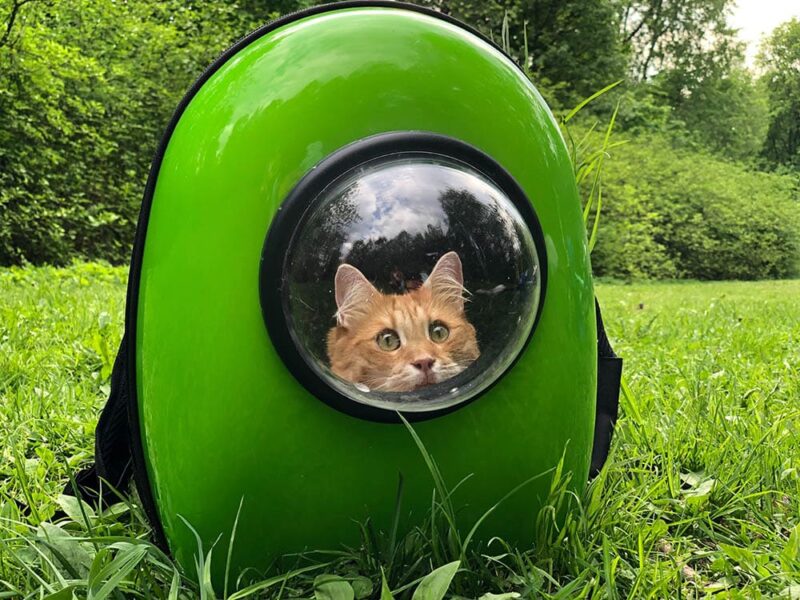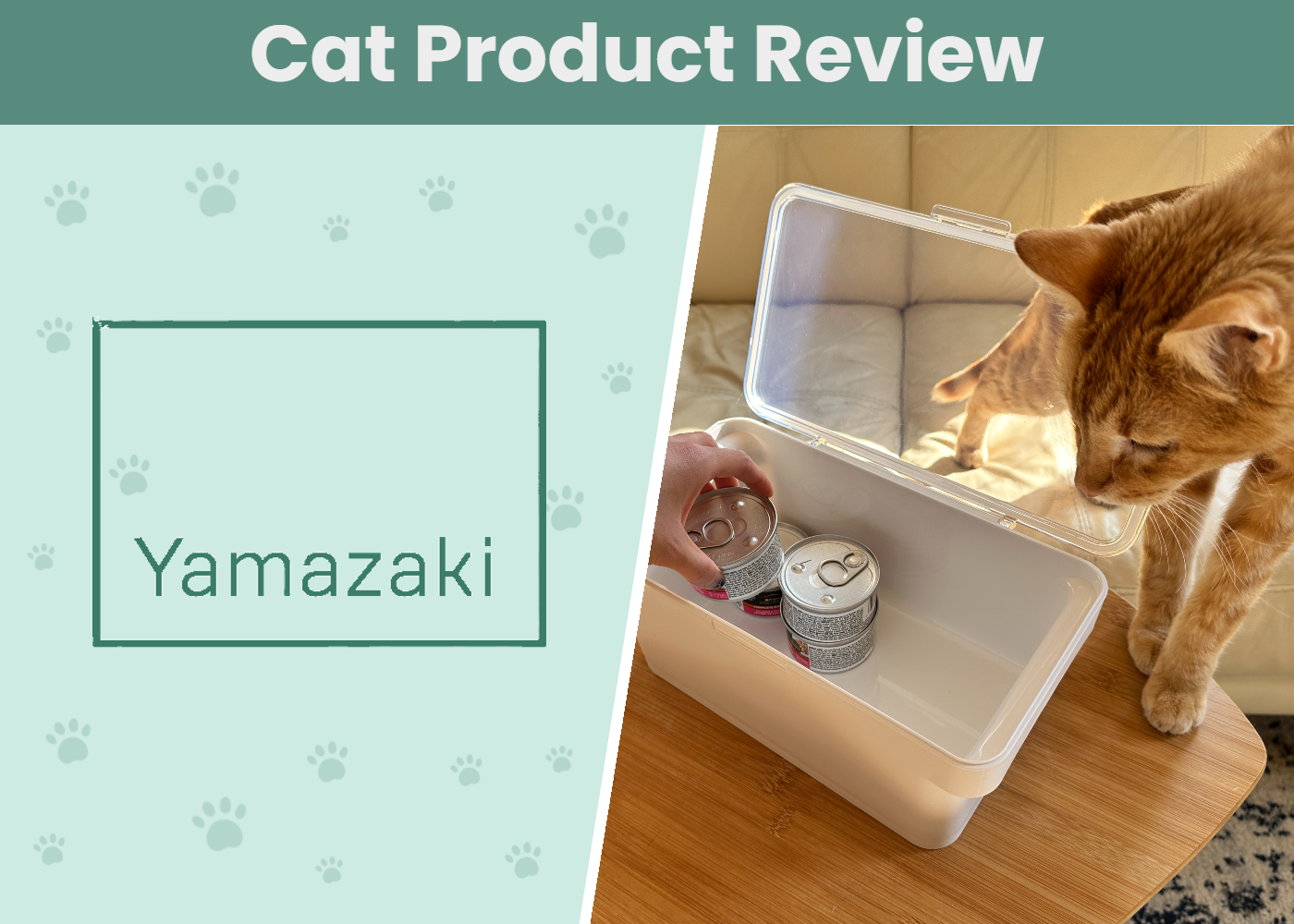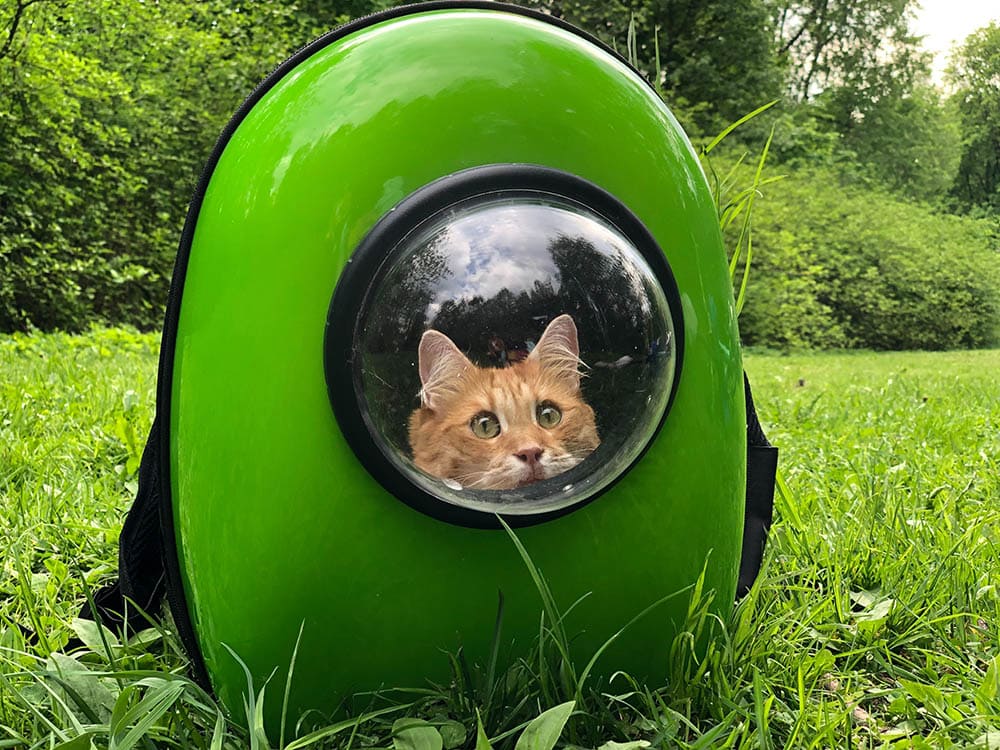
There are several items that all pet owners should have that are essential for taking care of a pet. While carriers aren’t necessarily at the top of the list, they are still important when you need to transport your cat, such as taking a visit to the vet or groomer, moving to a new house, or traveling on an airplane.
But there are so many cat carriers to choose from! We did the research for you and created reviews of 10 of the best cat carriers for Canadians. Our hope is that we save you a bit of time and effort and that you find the perfect carrier for your needs.
A Quick Glance at Our Winners in 2024
| Image | Product | Details | ||
|---|---|---|---|---|
| Best Overall |

|
AmazonBasics Large Mesh Pet Transport Carrier Bag |
|
CHECK PRICE |
| Best Value |
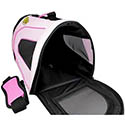
|
Pet Magasin Pet Travel Carrier for Small Pets |
|
CHECK PRICE |
| Premium Choice |
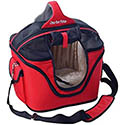
|
One for Pets Deluxe Cat Carrier |
|
CHECK PRICE |
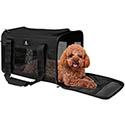
|
X-Zone Pet Carrier |
|
CHECK PRICE | |
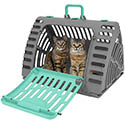
|
SportPet Designs X-Large Foldable Travel Carrier |
|
CHECK PRICE |
The 10 Best Cat Carriers in Canada
1. AmazonBasics Large Mesh Pet Transport Carrier Bag — Best Overall
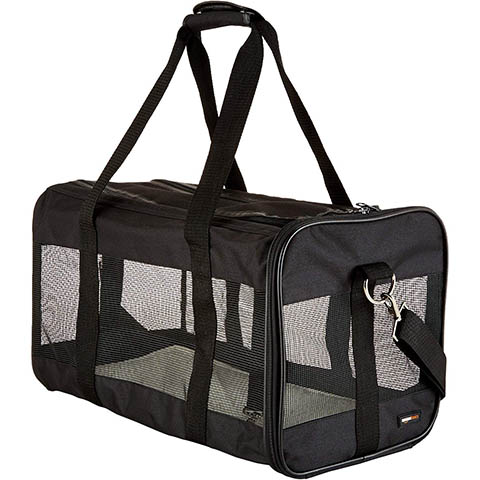
| Sizes: | Small, medium, and large (19.7 x 10.2 x 11.2 inches) |
| Style: | Soft-sided |
| Colour: | Black |
| Airline Approved: | Most airlines |
The best overall cat carrier for Canadians is the AmazonBasics Large Mesh Pet Transport Carrier Bag, partly because it’s one of the best airline-approved cat carriers, and it’s also quite moderately priced. It can fit under the seats of most airlines, and it’s available in three sizes, though this review is for the large. It supports up to 22 pounds and has a removable and machine-washable fleece pad that is comfy for your kitty. It has zippered doors on the top and front for easy loading, and it’s surrounded by mesh for excellent ventilation, so your cat will have a better view.
One flaw is that it’s a great carrier if you are traveling by plane or have kittens or a small cat, but if your cat is quite large, the bag’s height might be a little short. Also, it doesn’t have any extra storage, such as pockets.
- Airline approved for most airlines
- Available in three sizes — large supports up to 22 pounds
- Moderately priced
- Comes with a machine-washable fleece pad
- Front and top doors
- Might be too short for large cats
- No pockets or extra storage
2. Pet Magasin Pet Travel Carrier for Small Pets — Best Value
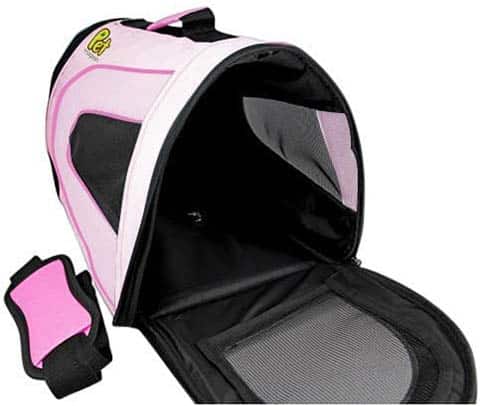
| Sizes: | Large — 18 x 11 x 10 inches |
| Style: | Soft-sided |
| Colour: | Pink or yellow/black |
| Airline Approved: | Most airlines |
The best cat carrier in Canada for the money is the Pet Magasin Pet Travel Carrier for Small Pets. There are four colours, but only the pink and the yellow are well-priced (the blue and orange are expensive). It’s approved for most airlines, and it can be folded flat for storage, but if it’s zipped up, it will hold its shape. It’s waterproof, so it’s easy to clean, and it has extra padding on the interior so your cat will stay safe and cozy. Additionally, it has an adjustable padded shoulder strap.
However, the carrier’s design is essentially a triangle shape, which means the top is tapered and might not be big enough for some larger cats. While it is ventilated, it is a little more closed in than many other carriers.
- Well-priced
- Can be folded for storage
- Waterproof and easy to clean
- Extra comfy padding on the inside
- Comes with a padded, adjustable shoulder strap
- Triangular shape makes it small for some cats
- Not enough mesh for cats to see out of
3. One for Pets Deluxe Cat Carrier — Premium Choice

| Sizes: | Small or large (18.5 x 14 x 9.8 inches) |
| Style: | Soft-sided |
| Colour: | Red or brown |
| Airline Approved: | No |
The One for Pets Deluxe Cat Carrier is our premium choice pick because it’s nicely sized and therefore, roomy for your cat. The top entryway can be completely removed so it can double as a cozy bed, which is made even cozier because the interior is lined in soft plush. It also includes a reversible pad that can be removed and washed, as well as a padded handle and shoulder strap.
The problems with this carrier are that it is expensive and that it’s more square than rectangular, so it can be awkward to carry.
- Roomy inside for some cats
- Top entrance can be removed completely
- Interior lined in soft plush
- Includes removable, reversible, and washable pad
- Padded handle and shoulder strap
- Expensive
- Awkward to carry
4. X-Zone Pet Carrier
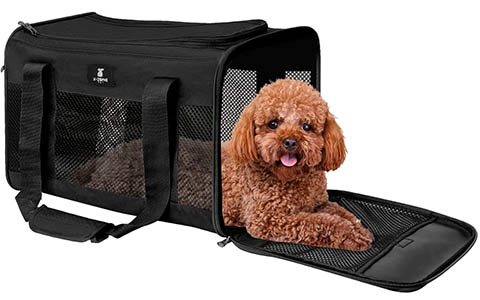
| Sizes: | Medium or Large (19.5 x 12 x 12 inches) |
| Style: | Soft-sided |
| Colour: | Black, grey, or purple |
| Airline Approved: | Most airlines |
The X-Zone Pet Carrier is available in several colours, but the less-expensive carriers are black, grey, and purple. It is designed to hold up to 20 pounds, fit under most airline seats, and has top and front entries. It has many mesh windows, so your cat will have a view and ventilation, as well as a base insert for added stability. The zippers can be locked for added safety, and the adjustable shoulder strap can double as a seatbelt.
However, if your cat has an accident, the carrier isn’t leakproof, and the large size might be a tight fit under some airline seats.
- Available in several colours
- Can fit under most airline seats
- Top and front entry
- Removable base insert for stability
- Lockable zippers and shoulder strap can function as a seatbelt
- Not leakproof
- Large size might be too big for some airline seats
5. SportPet Designs X-Large Foldable Travel Carrier
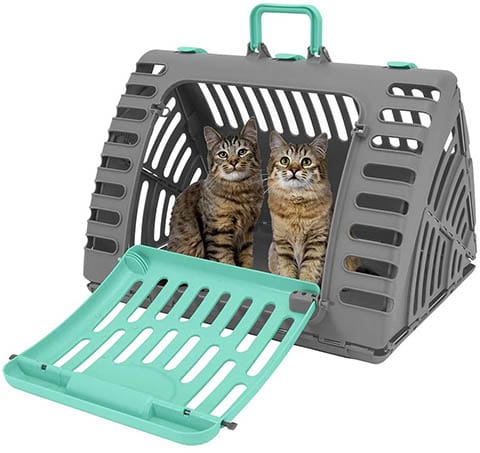
| Sizes: | XL (23.12 x 18.75 x 17.25 inches) |
| Style: | Hard-sided |
| Colour: | Grey/Green |
| Airline Approved: | No |
The SportPet Designs X-Large Foldable Travel Carrier is quite large and roomy and has a removable large side door so your cat can easily walk in. It folds down quite flat for easy storage and is made with durable plastic, so it’s easy to clean and can hold up to 35 pounds.
The issues with this carrier are that it is pricey and that it isn’t usable for air travel. It also comes with one carrying handle, but the heavier your cat is, the harder it will be to carry it.
- Roomy
- Large side door that is removable
- Folds flat for easy storage
- Made with sturdy plastic and is easy to clean
- Pricey
- Not for air travel
- Heavy
6. Pecute Pet Carrier Backpack
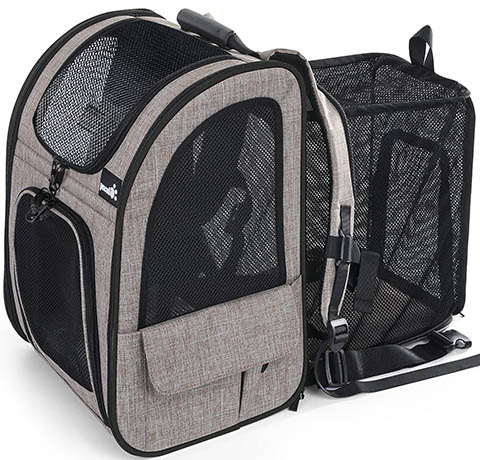
| Sizes: | 13.3 x 10.6 x 17.3 inches |
| Style: | Backpack |
| Colour: | Black, grey, light khaki, or blue |
| Airline Approved: | No |
Pecute’s Pet Carrier Backpack comes in various options and prices. The traditional carrier is the least expensive (although it’s still not cheap), and there are choices in black, grey, blue, or light khaki with either a mesh or acrylic window. That said, this is a handy backpack design with an expandable back, giving your cat more room to stretch out. The mesh versions have four breathable mesh areas for ventilation. The shoulder straps are adjustable, and there are two retractable buckles for added support and security.
However, while it’s nicely made and sturdy, the bottom of the backpack has a wire without padding, and you might find it digging into your back. For the backpacks with mesh windows, if your cat likes to claw and bite when inside a carrier, the windows might not withstand that kind of wear and tear.
- Backpack style with expandable back for more room
- Adjustable shoulder straps
- Four mesh areas for ventilation
- Retractable buckles for added stability and safety
- Side pockets for extra storage
- Bottom of the backpack might dig into your back
- Mesh might be flimsy for some cats
7. AmazonBasics Two-Door Pet Travel Carrier
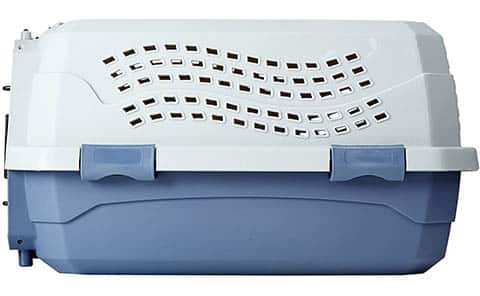
| Sizes: | 19, 23, 36, or 40 inches |
| Style: | Hard-sided kennel |
| Colour: | Grey/Blue or beige |
| Airline Approved: | In cargo, depending on airline |
The AmazonBasics Two-Door Travel Carrier is a sturdy kennel that comes in four sizes. It has top and front entries, and the top door can open on either side for convenience. It’s roomy, and most cats should be able to stand up and turn around easily. The sturdy plastic also makes it easy to clean.
The con with this carrier is that the heavier the cat, the more stress is placed on the latches that hold it together. This could lead to it potentially falling apart while carrying it. Additionally, the handle might eventually break.
- Top and front entry
- Top door can open from either side
- Quite roomy
- Sturdy and easy to clean
- Entire thing is held together by two latches
- Handle might break off
8. Petmate Two Door Pet Kennel
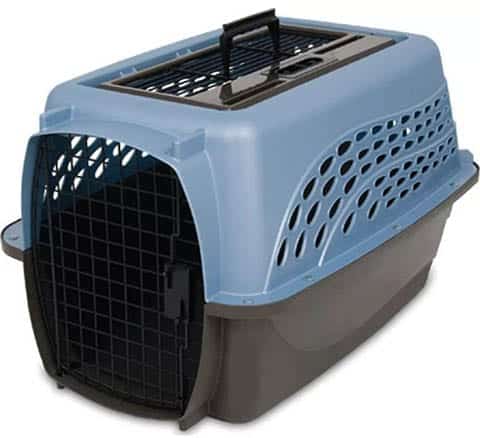
| Sizes: | 24 or 19 inches |
| Style: | Hard-sided kennel |
| Colour: | Blue, coffee, pink, red, or white |
| Airline Approved: | No |
Petmate’s Two Door Pet Kennel is available in two sizes and five colours, but they vary in price. They all have both top and front entries, and the larger size can hold up to 15 pounds. Opening the steel door should be simple with the squeezable latch, and the ergonomic handle makes it easy to carry too. The whole thing is held together with wingnuts and bolts, making for a secure carrier.
Unfortunately, sometimes the carrier arrives without the handle, which makes it practically useless, but the company should offer a replacement upon request. Also, when assembling, know that the holes for the wingnuts sometimes haven’t been bored all the way through.
- Comes in two sizes and five colours
- Top and front entries
- Easy to squeeze latch on the door
- Securely held together by wingnuts and bolts
- Doesn’t always come with the handle
- Holes for wingnuts not always bored all the way through
9. XZKING Cat Backpack Carrier
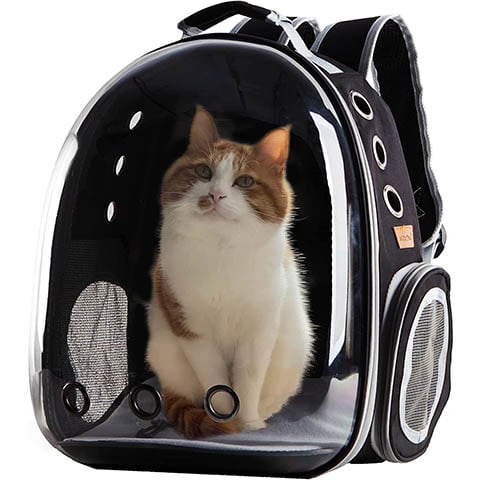
| Sizes: | 12.6 x 10.3 x 6.5 inches |
| Style: | Backpack |
| Colour: | Black, blue, gray, pink, red, yellow |
| Airline Approved: | Check with the airlines |
The XZKING Cat Backpack Carrier comes in various colours, some with the option of an expandable back (at a higher price). All options have a clear acrylic window so your cat can enjoy the view, as well as nine ventilation holes along the sides and front. It’s designed for cats up to 13 pounds, and it is technically small enough to bring with you for air travel, though you’ll need to check with the airline first. It has side pockets for storage, sturdy shoulder straps, and a handle.
The issue here is that the plastic dome, while handy for your cat to look out of, can get quite hot inside on sunny days. This backpack might work best in cool weather. Also, it has a strong plastic smell when new, and it might be too small for some cats.
- Six colours and possible option for expandable back
- Large clear acrylic window and nine ventilation holes
- Side pockets for storage
- Sturdy shoulder straps and handle
- Can get hot inside
- Strong plastic smell
- Might be too small for some cats
10. Midwest Homes for Pets Spree Travel Carrier
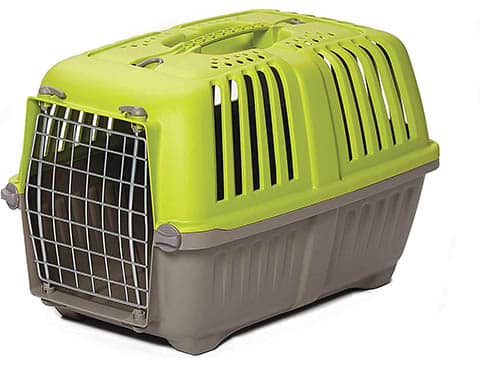
| Sizes: | 19 or 22 inches |
| Style: | Hard-sided kennel |
| Colour: | Green, red, or blue |
| Airline Approved: | No |
The Midwest Homes for Pets Spree Travel Carrier comes in two sizes and three colours. The green is the least expensive for the 22-inch, and the blue is the cheapest for the 19-inch option. It’s easy to assemble, and it’s made with durable plastic that is easy to clean. The handle is built in, so you don’t have to worry about it snapping off, and it has plenty of ventilation.
The issues are that the plastic used for this carrier seems kind of flimsy and is easily cracked and that the metal door tends to fall out when you try to open it. It’s best used for short trips.
- Two sizes and three colours
- Plenty of ventilation
- Built-in handle
- Plastic is easy to clean
- Flimsy plastic
- Door might fall out
- Best used for short trips
Buyer’s Guide: Buying the Best Cat Carrier in Canada
This guide is designed to further assist you in the decision-making process. We briefly cover a few topics that might make a difference in the kind of carrier that you end up with. We also go over important information like how to measure your cat, so you know that you’re getting the right carrier for your kitty.
Measuring Your Cat
Your cat should be able to stand up, lie down, and turn around comfortably in the carrier that you choose. While your cat is standing, measure from their ears down to their paws and then from their nose to their tail. You want the carrier to be about 1 ½ times bigger than your cat, so multiply the height and length of your cat by 1.5, and you’ll have an idea of how large the carrier should be.
Size
The outside measurements of the cat carrier are important if you’re bringing it on an airplane. But the inner dimensions are also essential because they can affect your cat’s comfort. When looking at the measurements online, shave an inch or two off the numbers to get the interior dimensions, as the manufacturers only post the outside measurements.
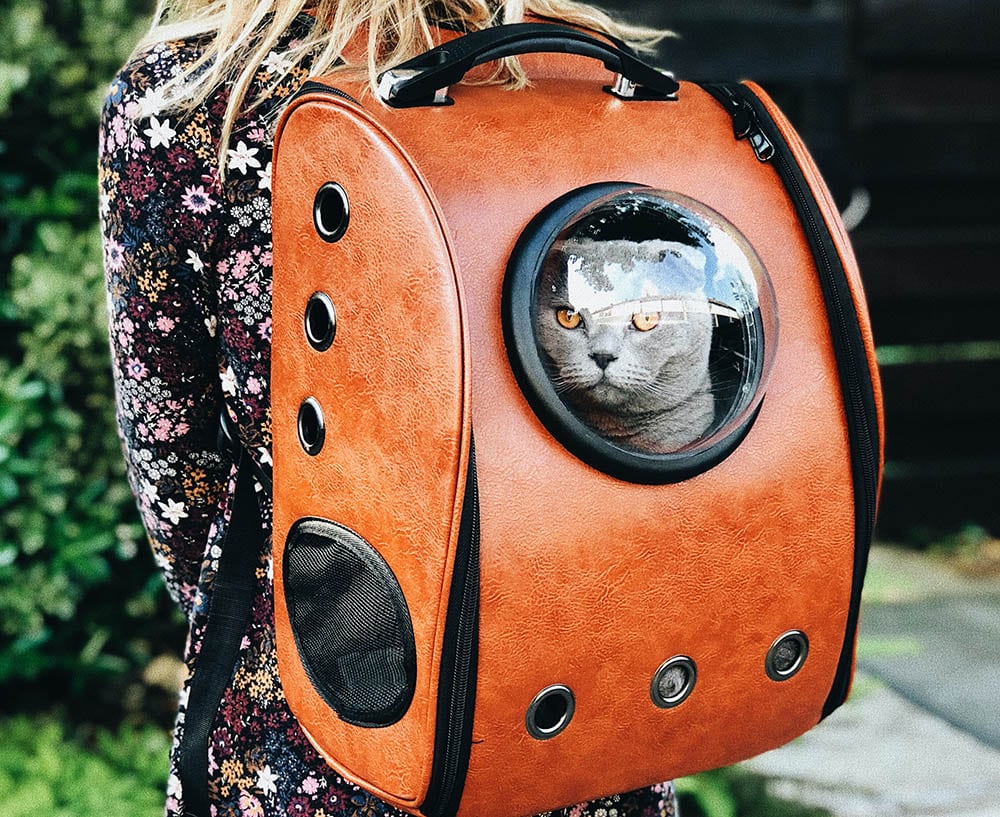
Contact the Airlines
If you plan on bringing your cat on an airplane, always contact the airlines before purchasing a carrier. Even if a carrier is advertised as “airline approved,” it doesn’t guarantee that your carrier is acceptable. Hard-sided kennels can only be used in cargo and shouldn’t have a top entry—most airlines won’t allow that kind. Soft-sided kennels need to fit under the seat in front of you. Since these carriers can be pushed down a little, there’s more to work with.
Price
Always double-check the options of the carrier that you’re interested in. Sometimes the colour alone can make a huge difference in the cost. Amazon has fluctuating prices, so if you have your heart set on a specific carrier, but it’s out of your budget, keep an eye on it, as you might see a price drop at some point.
Don’t forget to read reviews! Not everyone’s experience will be your own, but for the most part, people give their unbiased opinions on products.
Conclusion
Our favourite overall is AmazonBasics Large Mesh Pet Transport Carrier Bag because it’s quite moderately priced and fits under most airlines’ seats. The Pet Magasin Pet Travel Carrier for Small Pets is also approved for most airlines, and it can be folded flat for storage and all for a great price! Our premium choice goes to One for Pets Deluxe Cat Carrier, which is roomy and has a soft plush lining inside for your cat’s comfort.
We hope that these reviews have helped you find your cat a comfortable carrier that will make your travels a little easier.
Featured Image Credit: Helen, Pexels
Contents
- A Quick Glance at Our Winners in 2024
- The 10 Best Cat Carriers in Canada
- 1. AmazonBasics Large Mesh Pet Transport Carrier Bag — Best Overall
- 2. Pet Magasin Pet Travel Carrier for Small Pets — Best Value
- 3. One for Pets Deluxe Cat Carrier — Premium Choice
- 4. X-Zone Pet Carrier
- 5. SportPet Designs X-Large Foldable Travel Carrier
- 6. Pecute Pet Carrier Backpack
- 7. AmazonBasics Two-Door Pet Travel Carrier
- 8. Petmate Two Door Pet Kennel
- 9. XZKING Cat Backpack Carrier
- 10. Midwest Homes for Pets Spree Travel Carrier
- Buyer’s Guide: Buying the Best Cat Carrier in Canada
- Conclusion


